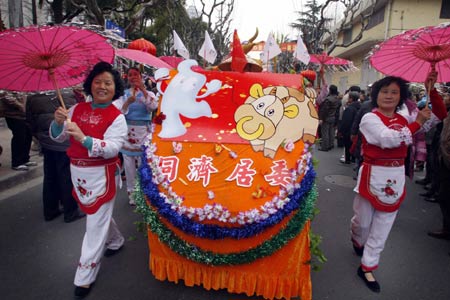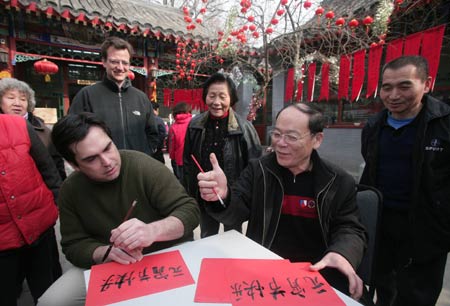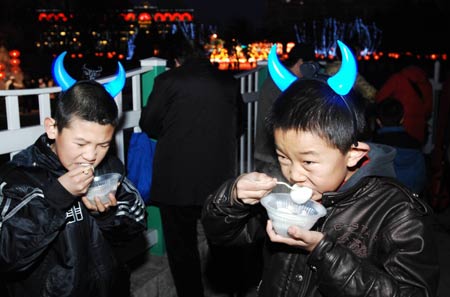BEIJING, Feb. 8 (Xinhua) -- Traditionally an occasion for family reunion, the Lantern Festival on Monday was celebrated widely by Chinese people in different ways.
In a Siheyuan, or walled quadrangle residence, in the Dongcheng district of Beijing, some foreigners were learning to make yuanxiao, a kind of snack like glue pudding which was made especially for the festival.
"Put the stuffing inside...that's right," a granny surnamed Li said while demonstrating the procedure herself.
A Mr. Jin made a red paper lantern and wrote "happy Lantern Festival" with his brush pen. Following his instruction, an American who would like to be identified with his Chinese name Zhang Zhimai wrote "yuanxiao is delicious".
"The Lantern Festival is important to the Chinese people. We invited the foreign friends to join us so as to help them feel the traditional Chinese culture," said Wang Xi, head of the Dongsisitiao community.
In the neighboring Tianjin Municipality, the third session of "lantern making contest" is going on, which is set from Sunday to Tuesday.
The lanterns made by citizens are hung on the ancient crabapple trees in the Old City Museum.
"Some folk artists are invited to make performances of calligraphy, painting, paper cutting, embroidery, flour sculpture, etc.," said Wang Liwen, curator of the museum.
In Inner Mongolia, the tradition of Zhuandeng was followed. Zhuandeng literally means walking around the lanterns, which bore a history of more than 3,000 years. A shelf made by more than 300 poles was made to hold 365 lanterns, each representing a day in one year.
"People believe that walking around the shelf symbolizes walking around hardship in the year," said Wang Yunliang, who organized the activity in Hohhot. Similar rituals were performed in Baotou and Bayannur as well.
In the Taer Monastery in Qinghai, more than 40 monks made Ghee flowers to celebrate the festival. Exhibition of ghee flowers, which the monastery was famous for, was held every year for the Lantern Festival.
The theme this year was the life story of Tsongkhapa, founder of the Geluk school, or the largest one of Tibetan Buddhism.
 |
| Local residents parade with a self-made colorful float on the Siping Street, Yangpu District, east China's Shanghai, Feb. 7, 2009. (Xinhua/Zhang Haifeng) |
Similarly, in Shanghai, flowers were also used for Lantern Festival celebration, but these were real.
More than 150 plants with their names carrying the character "Deng" or "lantern" were exhibited in the Shanghai arboretum, some even with their shape resembling a lamp.
Lantern Festival, which fell on the fifteenth day of the first month in China's lunar calendar, was seen as end of the Spring Festival.
During the festival, people, especially children, go out at night carrying paper lanterns and solve riddles on the lanterns. Young ladies who normally stayed at home were chaperoned in the streets in the hope of finding love.
According to Wu Bing'an, a professor of Folklore, 17 ethnic groups, including Han, Mongolian, Korean, Hui, Tibetan, and Manchu, had the tradition to celebrate the festival.
The Lantern Festival came into the list of China's intangible cultural heritage last year.
At the end of 2007 China rescheduled its national legal holidays, adding three traditional Chinese festivals, including the "Tomb-Sweeping Day," "Dragon Boat Festival" and "Mid-Autumn Festival," as legal holidays.
Hence many advocated that people should enjoy a day off work during the Lantern Festival as well.
"In the past Lantern Festival was a carnival. It is close to the Spring Festival and people are still in the atmosphere and mood of celebration," said Liu Xuebin, curator of the Jinan folk art museum of Shandong province. "No matter judged from its history or the current situation, the day deserves to be a legal holiday," he said.
Li Yunzheng, a folk artist in Xi'an, capital of Shaanxi province, believed that "making traditional festivals legal holidays could help rejuvenating ancient culture". While Feng Jicai, president of the China Folklore Society, is also for the appeal.


